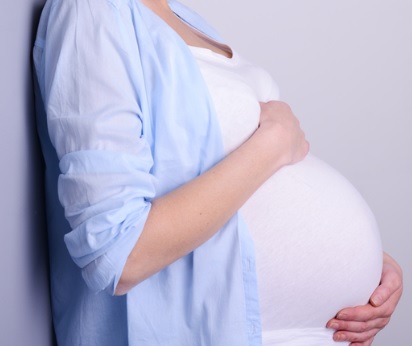Pregnancy and childbirth in prison
by Dr Laura Abbott, University of Hertfordshire, UK · Published · Updated

“I’ve got baggy tops, so I just always have to hide my bump, and like most people couldn’t recognise that I’m pregnant, so that’s a good thing”.
With a prison population of approximately 9000 women in England, it is estimated that approximately 600 pregnancies and 100 births occur annually. Despite there being an extensive literature on the sociology of reproduction, pregnancy and childbirth, there has been scarce qualitative research looking specifically at pregnant prisoners.
Our recently published open access paper: Pregnancy and Childbirth in English Prisons: Institutional Ignominy and the Pains of Imprisonment reports an ethnographic study in three English prisons, including interviews with 22 prisoners, 6 women released from prison and 10 staff members. With the setting so intrinsic to the imprisoned pregnant woman’s experience, ethnography was chosen as the methodological approach to understand fully those experiences, viewed through the subjective lens of midwife/prison researcher. The skills of navigating the prison system and communicating with women and staff were developed prior to commencing fieldwork. The atmosphere and environment were captured through descriptive fieldnotes and gave context to the women’s experiences in the 10 months spent in the field.
Most of the women interviewed were imprisoned for non-violent crimes such as theft, fraud and drug offences. However, many experienced having to be handcuffed on multiple outings to hospital, so they believed that the public viewed them as dangerous criminals and unfit mothers. A central theme running through this research was shame causing painful humiliation for the pregnant woman. Designated as ‘institutional ignominy’, it captures the sense of Goffman’s ‘mortification of self’ which is revisited as a cyclical pain for the pregnant woman as she is moved in and out of prison. The embarrassment came with the artefacts of power and control such as handcuffs, yet the most excruciating humiliation for women was being seen in public as a ‘pregnant prisoner’. The sense that her pregnancy, guarded by prison officers and wearing handcuffs, symbolised her as ‘unfit mother’ and a therefore a public spectacle of shame. The ultimate shame of giving birth in a prison cell, an oft-expressed fear of many of the women in this study, was realised by one participant and described by several staff members as an unusual but not isolated spectacle.
In common with other research, prisoners were good at ‘masking’ their pains, often retreating to their cells at nighttime where emotions would flow. Nonetheless, the difference between pregnant prisoners and the general prison population (and pregnant women in mainstream society) was the wish for some to conceal their pregnancies. The wish to blend in to avoid being singled out for attention or, worse, threats of violence, intensified their stress. The intensity of masking concerned women about the effect of stress on their unborn baby. Our paper draws on Erving Goffman’s concepts of closed institutions, dramaturgy and mortification of self and Crewe et al.’s work on the gendered pains of imprisonment. The development of the concept of ‘institutional ignominy’ builds upon Goffman’s premise of the process of mortification, e.g., entering the institution and being deprived of outside networks recurrently as she transitions between prison and hospital during her pregnancy.
The expression of shame was a probable expectation, given previous research and concepts of stigma. Nonetheless, findings reveal that ignominy was intensified as an institutional response to pregnancy when women felt paraded in public and branded with prisoner emblems. The inner torment this caused women was often expressed in indignance, that being a prisoner did not warrant what they perceived to be the public judgement that they were failing as a mother. The uniqueness of this finding suggests that pregnancy, and the resulting inevitability of regular outings in public for health assessments, accrues additional suffering and shame for a woman different from any other type of prisoner experience. Staff, although often demonstrating kindness, revealed conflict in wishing to support pregnant women without showing special treatment. Women, too, would often feel confusion in being treated as the same as a normal prisoner whilst feeling vexed that their pregnant status should be sacrosanct; this, juxtaposed with the tensions of not wishing to stand out, creating a sense of inner turmoil.
From the outset, I was ambitious that this research would positively influence the way pregnant women in prison are perceived, make an impact on society and build a substantive theory about a phenomenon – institutional ignominy. I have been indelibly affected by the experiences of the women, and subsequently continue to campaign for better conditions.
The impact of this research has already gained impetus at governance and policy level, see evidence given to the Joint Commitee on Human Rights, and Royal College of Midwives Position Statement ensuring increasing motivation to set about making changes happen. The English prison has a hidden and minority population of pregnant women confined within. This paper has illuminated some of their experiences, from the indignity and fear of birthing in a cell and the shame of feeling paraded in public, contextualising women’s voices. My hopes for the future are that we can reform the landscape for pregnant women in prison so that negative experiences detailed within this research are not replicated and the opportunities for transformation are realised to their full potential.
Author biography:
Dr Laura Abbott is a Senior Lecturer in Midwifery at The University of Hertfordshire and a Fellow of the Royal College of Midwives. Laura’s doctorate examined the experiences of pregnant women in prison: The Incarcerated Pregnancy: An Ethnographic Study of Perinatal Women in English Prisons. Laura volunteers with the charity Birth Companions and co-authored The Birth Charter for pregnant women in England and Wales published by Birth Companions in May 2016. She has been publicly recognised as one of the Nation’s ‘lifesavers’ from ‘Made at Uni’ for her research. Laura hopes to continue to highlight the issues facing women, campaigning for the recommendations arising from her research to be actioned, meaning change on the ground for pregnant women and new mothers in prison.




1475-682X/asset/akdkey.jpg?v=1&s=eef6c6a27a6d15977bc8f9cc0c7bc7fbe54a32de)
1756-2589/asset/NCFR_RGB_small_file.jpg?v=1&s=0570a4c814cd63cfaec3c1e57a93f3eed5886c15)